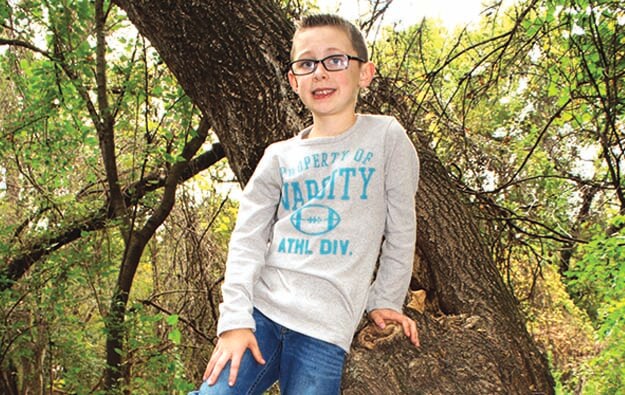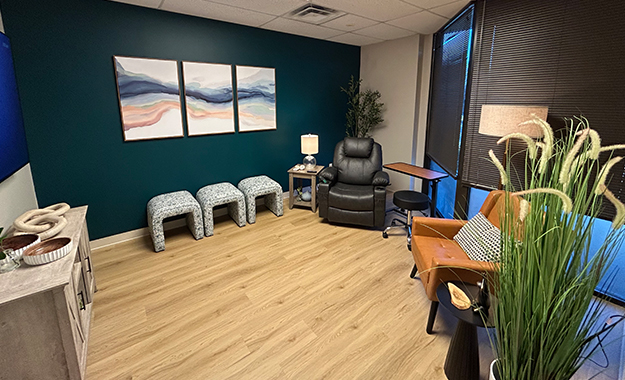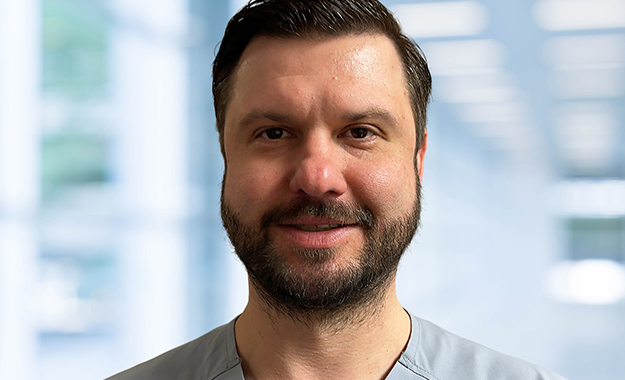Klaytin’s Story

Neurology infusion therapy for rare epilepsy disorder
When Rebecca and Devon welcomed baby boy Klaytin to the world seven years ago, they were on cloud nine. It wasn’t until after Klaytin’s first birthday the couple noticed behavior that concerned them. “He kept falling over and could not control it. I initially thought he was being silly and wanted to play,” explains Rebecca. “As each day passed, we started seeing more signs that something wasn’t quite right.”
Rebecca and Devon took Klaytin to his primary care physician and later to an orthopedic specialist. “Everything appeared fine,” said the mom of three. “But that gut feeling wasn’t going away.”
Over time, Rebecca noticed Klaytin struggling in pre-K activities. He was having difficulty remembering shapes, numbers, and colors. “He would learn things and then later forget,” she says. They took him to the family doctor again, but this time Klaytin was referred to a neurology specialist. “Our family physician was not exactly sure where to send us. It was getting a little scary.”
The neurologist performed a video EEG (electroencephalogram). This test monitors and picks up electrical signals produced by the brain. The tests revealed abnormal activity, indicating Klaytin had been experiencing seizures. The seizures were never consistent—each episode looked different, and each seizure varied in length severity.
The family finally had a diagnosis to explain their son’s behavior: Klaytin was struggling with a rare epilepsy disorder called electrical status epilepticus during slow-wave sleep (ESES).
Things were starting to add up for the family of five. It’s common for children with epilepsy to experience developmental and emotional problems if not treated properly.
Only .05 to .06 percent of all childhood epilepsy cases are identified with this type of illness. “We had a diagnosis, but what about treatment? I was in disbelief,” says Rebecca. “We wanted to do something to help our son have a normal life.”
As the desperate parents continued their search for answers, they connected with a family friend who experienced a similar situation. Tragically, their child received ineffective treatment and passed away from experiencing too many seizures. Rebecca and Devon were beside themselves.
Each case is unique, and currently there is no medication that works 100 percent of the time. As the tenacious mother logged hours online finding support groups and treatment options, she needed something to give her peace of mind. During this time, Klaytin tried and failed many anti-epileptic drugs and received steroids daily to help minimize the symptoms.
Months later, Klaytin’s neurologist connected the family with physicians at Mayo Clinic and other practices around the world. They recommended trying IVIg (intravenous immunoglobulin), a therapy used to help patients with autoimmune disorders. This approach is slowly growing in popularity for people with rare epilepsy cases.
But it was PromptCare’s reputation, services, and word-of-mouth referral that encouraged Rebecca and Devon to seek in-home infusion care.
“It was through prayer and the support of others that we found PromptCare. It changed everything.”
Rebecca, Klaytin’s Mother
The care plan was finalized. PromptCare’s pharmacists would help manage the specialty medication while pediatric-trained nurses would create a comfortable infusion setting for Klaytin in the family’s home. “Before finding PromptCare, we thought we would have to travel to the hospital regularly,” says Devon. “We were glad to find out they could come to our home.”
This April, Klaytin will be three years seizure-free thanks to his parents’ and PromptCare’s perseverance. The renewed energy and happiness in this young boy’s heart are reason enough to never give up hope.
To celebrate the occasion, the happy family threw a party with more than 200 family members and friends in attendance. There was tug-of-war, old-fashioned outdoor games, and comfort food. But what made the event memorable was a special balloon release to honor Klaytin’s recovery. Each guest wrote down what they were thankful for on the balloon before releasing it into the sky.
“It was a big moment for us,” says Rebecca. “We were so thankful, and we needed to celebrate and rejoice.”
All Things Considered.
Support for clinically complex infusion therapy looks different for everyone.
We go beyond the case file to understand lifestyles and limitations to deliver personalized care. Seeing you as your full self—now that’s support.
Contact our compassionate team at 866-776-6782 to learn how we can help you or your loved one.


